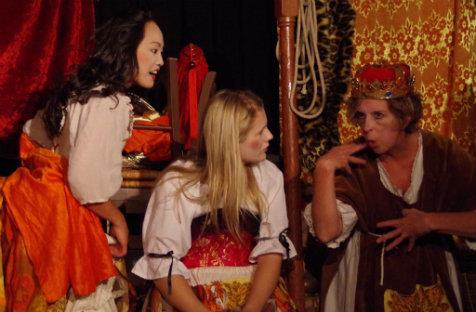First performed in 1993 at the Haymarket Theatre, London, Playhouse Creatures by British playwright April de Angelis is an insight into, and commentary on, the earliest days of women’s appearances on the London stage. Yet its intent is deeper: we see in the lives of five ‘creatures’ a reflection of the struggles all women – and especially female entertainers – are likely to experience.
HIVE – an acronym for ‘Her Infinite Variety Ensemble’ – is a new company that aims to give opportunities to women in theatre. As an example, Shirley Van Sanden, better known as a performer and director, here takes her first steps into stage management, and what a great job she has made of it! The show has obviously been put together on a shoe string: the Alliance (MEAA) was kind enough to give the players the use of their Guild Studio as a kind of ‘pop-up’ theatre. The set was made up of a pile of boxes covered in somewhat bedraggled cloths and covered in costumes, props, personal items and other bits and pieces. But it worked beautifully. Most entertainers can remember turning up at gigs where they were expected to change in the storeroom and go outside to use the mirror in the loo – in some ways, nothing much has changed since the 17th century!
This theme, the unchanging fact of human nature, is one of many that form the colourful weft to this play’s warp. We start with bawdy comedy, and here again, any dancer who has worked in a ‘line’ or a burlesque show, will know the stock characters. You find them in straight theatre as well – the rather snooty one who has Connections and Proper Training; the sneaky little ingénue who has somehow wormed her way in with no training or experience at all; the girls who rely more on their looks than their ability, and who seek the protection of a nice sugar daddy to boost their incomes. If they are sensible these ladies will squirrel a bit away for a rainy day, but sadly, most of them don’t, and later in the play we see the consequences when poor Elizabeth Farley (Tiffany Barton), cast aside by her wealthy lover, is forced to abandon her baby on a doorstep and turn to prostitution, eventually to die of venereal disease. In today’s world, with decent social security and more career opportunities for women, these trials need not and should not happen, but in Nell Gwynn’s London they were par for the course.
Barton made me weep for Elizabeth and the countless other girls who have been used and cast aside, not only by lovers, but by the entertainment industry and the world at large. This entire scenario was metaphored by a red petticoat, first worn under Elizabeth’s skirt, sold to Nell Gwyn, who gave it back, thus showing her to be one of the sensible ones who was ‘only whore to one man’. (In fact she did very well out of it and unlike poor Elizabeth, still has descendants alive today.) Later, when Elizabeth is a ‘scarlet woman’, she wears the petticoat on the outside, and she is still wearing it when she dies.
Nell Gwyn is treated more kindly. After all, how could anyone write a play about theatre in Restoration England without using Nell Gwyn as a character? Cheekily played by the irrepressible Rhoda Lopez, Nell and her exploits give the audience a lot of laughs. Her relationship with the haughty Mrs Betterton (Angelique Malcolm) provides lots of opportunities for banter. Summer Williams as Rebecca Marshall provides a foil to Nellie, while the inimitable Claire Munday once again uses her talent for accents as cockney Doll Common, a character borrowed from Ben Jonson’s The Alchemist via Samuel Pepys – it was his nickname for an actress who played that role. Here, she is a participating continuity department: she comments on the action like a Greek chorus as she acts as dogsbody to Mrs Betterton, fills in small parts in performances and looks after the wardrobe and props. It is she who, like a chorus, begins and ends the play and she who holds it together. She is both a ghost and a real person, another metaphor, perhaps, for the way women have long been regarded in a male-dominated world. When she was a girl, the theatre was a bear garden, and Dot still remembers the savagery performed on a she-bear who loved to dance, but hated being made to do it. She still hears the bears calling, and these sounds stand in for the noise made by an audience that has largely come to see female flesh exposed – another of the subtle metaphors that abound in this production. Even the title, reminiscent of Ibsen’s A Doll’s House, carries a wealth of meaning in its references.
There is a lot of bad language and a bit of boob-flashing in Playhouse Creatures, which might upset some patrons, but overall it is simply realistic in its approach. I cannot imagine Nell and her contemporaries behaving otherwise, even if liberties have been taken with the language. For example, ‘fucking’ as an expletive adjective, is a comparatively recent addition to our vocabulary, and jarred a little, but swear words of the 17th century would, after all, mean little to a modern audience.
But overall, Playhouse Creatures is such a funny, touching, play that we must forgive the anomalies. I would go so far as to say that it is one of the strongest feminist statements I have seen in any medium, and one of the funniest plays I’ve seen in years. I hope to see more of this ensemble and of Helen Doig’s work thoughtful work as director.
Rating: 4 ½ stars
HIVE presents
Playhouse Creatures
Author: April de Angelis
Director: Helen Doig
Stage Manager: Shirley Van Sanden
Cast: Tiffany Barton, Rhoda Lopez, Angelique Malcolm, Claire Munday, Summer Williams
The Guild Studio, Perth,
22 May – 8 June





